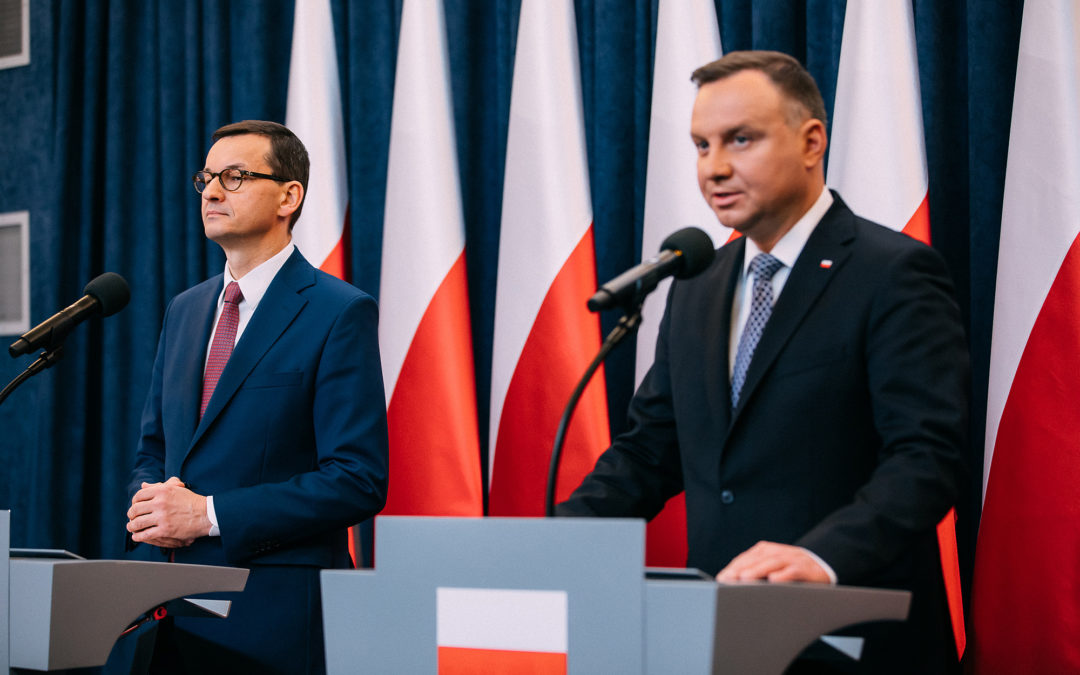By Aleks Szczerbiak
Although Polish public attention has been focused entirely on the effects of the pandemic, political calculations are still being made behind-the-scenes and there is a fierce debate about whether the May presidential election should go ahead as scheduled.
So far the government and right-wing ruling party-backed President have benefited from the “rally effect” of increased support for political leaders at times of sudden external threat, but this could change rapidly if the public feels they are not handling the crisis competently.
A crucial, unpredictable election
Until a few weeks ago, it was assumed that Polish politics in the first half of 2020 would be dominated by the crucially important presidential election, scheduled for 10 May 10, with a second-round run-off a fortnight later between the two leading candidates if none secured more than 50% of the votes.
A victory for incumbent Andrzej Duda – who is supported by the right-wing Law and Justice (PiS) grouping, Poland’s ruling party since autumn 2015 – would have given the government a three-year run without any national elections to continue implementing its programme of radical state reconstruction. However, given that the party lacks the three-fifths legislative majority required to over-turn a presidential veto, Duda’s defeat would seriously hamper PiS’s ability to govern effectively and possibly precipitate an early parliamentary election.
Given his relatively high approval ratings and the fact that he was Poland’s most trusted politician, Duda was widely assumed to be the favourite. At the beginning of March, the “Ewybory” website that aggregates voting intention surveys found him averaging 42% support, nearly twenty points ahead of his nearest rival Małgorzata Kidawa-Blońska, the candidate of the liberal-centrist Civic Platform (PO), Poland’s ruling party between 2007-15 and currently the main opposition grouping. Polls also suggested that Duda would defeat all potential challengers in a second round run-off, albeit by a much narrower margin.
At the same time, however, last autumn’s parliamentary election – when PiS retained its overall majority but lost control of the Senate, the less powerful second chamber – showed how polarised and evenly balanced support for the government and opposition was, with many voters determined to use any opportunity to block the ruling party.
Indeed, the opposition’s strategy was to turn the presidential election into a plebiscite on the PiS government by tying Duda as closely as they could to the ruling party. Although PiS continued to enjoy a clear opinion poll lead, the government was feeling the strain of having been in office for four-and-a-half years and the second-round run-off was expected to be extremely closely-fought and unpredictable no matter how weak the opposition candidate was.
Benefiting from the “rally effect”
However, since the middle of March public attention has, for obvious reasons, been entirely focused on the government’s actions to limit the spread of Coronavirus pandemic. At the same time, while there has been practically no formal election campaigning, Duda has attracted a huge amount of media coverage by simply fulfilling his state duties as president: convening meetings of the National Security Council (RBN), travelling around the country checking on coronavirus preparations, and making TV appearances at border checkpoints, hospitals, and foodbanks.
Moreover, PiS has actively portrayed Duda as an integral part of the governing camp. Giving the impression that the president was on the front line of the battle against the virus, the government has made Duda the focus of a number of its daily briefings and key, headline-grabbing announcements of government programmes – such as the 212 billion zloty “anti-crisis shield” (tarcza antykryzysowa) of measures to help deal with the pandemic’s economic consequences – even though he lacks formal competencies in many of these areas.
For their part, opposition presidential candidates have accused PiS of trying to exploit the crisis to secure Duda’s re-election, arguing that, while his state presidential duties are often very difficult to separate out from election campaigning, the government’s social-distancing restrictions have made it practically impossible for them to meet with voters directly.
At the same time, the opposition has found it extremely difficult to contribute meaningfully to public debate. This is partly because it lacks any formal policy instruments to tackle the crisis, but also because if the opposition is too critical of the government, then it leaves itself open to charges of engaging in partisan politics at a time when the country faces an unprecedented epidemiological crisis. On the other hand, if PiS’s opponents adopt a too conciliatory approach they risk being completely sidelined.
In the longer term, PiS will be held to account for any perceived shortcomings in its handling of the crisis – particularly if it is felt that the health service was not coping effectively or the government was failing to tackle the negative socioeconomic consequences of the quarantine measures – and this could damage Duda.
For sure, PiS has increased health expenditure in recent years, and pledged to continue to do so in the future. But the party’s critics argue that the health service remains underfunded and understaffed because the government has neglected it in order to finance its generous social and welfare programmes.
The government’s opponents also argue that these large fiscal transfers have left the public finances exposed at a time when it has to find extra funds to deal with the pandemic’s economic fallout. PiS supporters, on the other hand, say that, as a result of closing tax loopholes, until the crisis emerged the government was actually on track to post a balanced budget this year.
However, in the short-term Duda and the ruling party are benefiting from an increase in public support driven by an inevitable psychological tendency for worried citizens to unite around their political leaders and institutions as the embodiment of national unity when they feel that they face a dramatic external threat – a concept political scientists call the ‘rally effect’.
For example, a March survey by the Kantar agency for the Gazeta.pl news service found that 73% of respondents evaluated the government’s response to the pandemic favourably and only 23% did so unfavourably. Duda has also seen an increase in his poll lead: the “Ewbyory” website found him averaging 48% support in opinion surveys conducted during last fortnight compared with only 17% for Kidawa-Błońska.
As long as the government appears to be broadly on top of, and trying to cope as effectively as it can with, the crisis it will, for the moment at least, continue to politically strengthen Duda and the governing camp.
Fierce debate over election timing
Nonetheless, the acceleration of the virus and increasingly restrictive measures being introduced by the government to avoid its spread, have provoked a fierce debate as to whether the presidential election should still go ahead at all. All of the main opposition candidates have now come down in favour of postponing the poll, arguing that the country is in a de facto state of emergency which makes normal election campaigning virtually impossible.
They accuse PiS of sacrificing Poles’ health for political gain by proceeding with an election when it is dangerous to do so, and say that all the authorities’ energies should be directed at fighting the virus and keeping the economy afloat. Indeed, at the end of March Kidawa-Błońska completely suspended her campaign and called for a boycott of the election, although no other opposition candidate has yet followed her lead.
However, for the moment PiS has refused to yield to opposition demands and insists that the election will be held according to the planned scheduled, arguing that postponing it now would be premature and de-stabilise the political system at a time of crisis. They accuse the opposition of disingenuousness in conflating Duda’s state duties with election campaigning and argue that he too is disadvantaged by the restrictions on large public meetings with voters given that this was one of his most effective campaigning tools.
PiS argues that the opposition is calling for the presidential poll to be postponed out of self-interest and in an attempt to de-legitimate an election that they know they will lose, and, according to some commentators, give themselves time to re-group and find a stronger candidate than Kidawa-Błońska.
Nonetheless, notwithstanding arguments about whether the conditions exist to conduct a meaningful election campaign, some commentators have argued that it will simply be technically impossible to conduct an election at a time of epidemiological emergency. They warn that trying to hold it in such circumstances risks undermining the election’s credibility which, given that democracy is based on trust in state institutions and electoral procedures, could have huge consequences for the Polish political system and national stability in such a politically divided and polarised country.
Organising elections is a huge logistical challenge, which in Poland involves around a quarter-of-a-million (often elderly) people who have to be trained (usually in large groups) to staff thousands of local election commissions. Moreover, many Poles currently live abroad in “locked down” countries and will find themselves barred from voting, while older and more vulnerable voters are still likely to be quarantined in May, while many others will be self-isolating or simply not wish to take the risk of taking part.
To tackle this problem, the Polish parliament is considering a PiS-sponsored amendment to the electoral code to give all citizens the option of a postal vote, although the opposition argues that introducing such a change so close to an election is unconstitutional.
PiS wants May's presidential election to be conducted only by postal voting, with polling stations closed, sources tell @RMF24pl. They will reportedly submit the proposal to parliament tomorrow. However, if, as expected, the opposition-controlled Senate… https://t.co/iOFUgQJPjX
— Notes from Poland ?? (@notesfrompoland) April 2, 2020
In fact, PiS says that it is continually reviewing the situation and some of its leaders, including Duda, acknowledge that holding a May election could be an unsustainable health risk if the pandemic is ranging and national quarantine regulations are still in place.
Although it appears increasingly likely that the government will, indeed, postpone the presidential poll a final decision on this is unlikely to be taken until after the Easter break. The judgement of Poland’s currently hugely popular health minister Łukasz Szumowski is likely to be a crucial factor in this.
Indeed, the ruling party could be playing hard ball on the question of election timing so that it can negotiate the most favourable terms for any delay. The government’s supporters believe that scheduling the election in the autumn, which the opposition is calling for, could be extremely problematic because the coming months are likely to bring an economic slowdown, if not outright recession.
Some of them, therefore, favour a longer, one year delay so that the government can tackle the aftermath of the crisis before Duda has to face the voters. However, there is currently no provision in the Polish constitution for introducing such a long delay in one go, so PiS requires the co-operation of opposition parties to secure this.
Political calculations still matter
The coronavirus pandemic has completely overshadowed and profoundly affected all aspects of Polish politics and public life, rendering earlier government and opposition presidential election campaign talking points and debates irrelevant. Nonetheless, political calculations are still being made intensively behind-the-scenes by both sides, including on the timing of the election.
Public evaluations of the ruling party and President Duda will ultimately be determined by whether or not the government is felt to have handled the crisis competently. These could change very rapidly if the pandemic gets much worse and the health service is severely tested or when the effects of the quarantine restrictions start to take their full toll on the economy.
However, for the moment at least, PiS and Duda have garnered strong support from Poles for their apparently decisive and tough response to the crisis and benefited politically from the inevitable “rally effect” of increased backing for political leaders and state institutions at times of sudden external threat.
Main image credit: Krystian Maj/KPRM/Flickr (under CC BY-NC-ND 2.0)





















